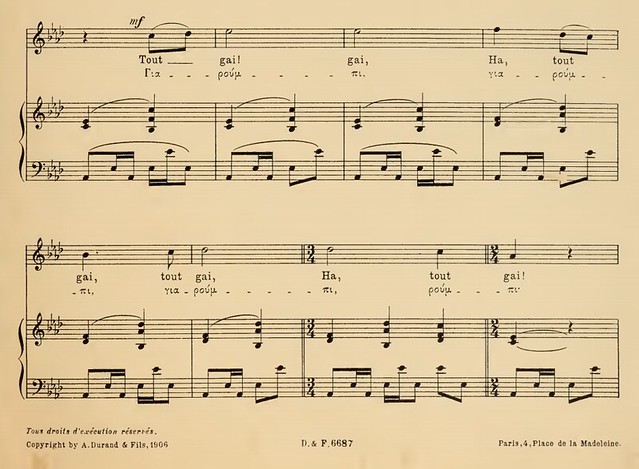Theseus
¥
Two questions:-
What does Γιαρούμπι mean if anything? It is a Rebetik song & I fancied--a wild guess--that it might be a corruption of για Ραμπή (O God). Let no better etymologist attack me. It is a wild, & wrong, guess.:)
And in the song:-
Δεν ημπορώ τα μάτια μου
ψηλά να τα σηκώσω
και της καημένης μου καρδιάς
αγέρα να της δώσω
Για ρούμπι χάνομαι για ρούμπι πεθαίνω
κι εγώ για σένανε σκίζω τη γης και μπαίνω
Μαριγίτσα τσίκι τσίκι σπάσ’ τα
τα βραχιολάκια σου
Ποια θάλασσα ποιος ποταμός
ποια βρύση δε θολώνει
ποιος έχει αγάπη στην καρδιά
και δεν τη φανερώνει
Για ρούμπι χάνομαι για ρούμπι πεθαίνω
κι εγώ για σένανε σκίζω τη γης και μπαίνω
για ρούμπι τα ποτήρια σπάσ’ τα
με τα χεράκια σου
Ποιος πληγωμένος έγιανε
να `χω κι εγώ το θάρρος
να `χω κι εγώ παρηγοριά
πως δε με παίρνει ο χάρος
Για ρούμπι χάνομαι για ρούμπι πεθαίνω
κι εγώ για σένανε σκίζω τη γης και μπαίνω
Μαριγίτσα τσίκι τσίκι σπάσ’ τα
τα βραχιολάκια σου.
Why would Maritsa be Biden to break her bracelets. Is it a female equivalent of the 'shattering of glasses', meaning here presumably a gesture of mourning, as is part of the symbolism at weddings--a reference to a relationship broken at death.
BTW, I'm sure this song could be better punctuated to convey the meaning more easily!!
What does Γιαρούμπι mean if anything? It is a Rebetik song & I fancied--a wild guess--that it might be a corruption of για Ραμπή (O God). Let no better etymologist attack me. It is a wild, & wrong, guess.:)
And in the song:-
Δεν ημπορώ τα μάτια μου
ψηλά να τα σηκώσω
και της καημένης μου καρδιάς
αγέρα να της δώσω
Για ρούμπι χάνομαι για ρούμπι πεθαίνω
κι εγώ για σένανε σκίζω τη γης και μπαίνω
Μαριγίτσα τσίκι τσίκι σπάσ’ τα
τα βραχιολάκια σου
Ποια θάλασσα ποιος ποταμός
ποια βρύση δε θολώνει
ποιος έχει αγάπη στην καρδιά
και δεν τη φανερώνει
Για ρούμπι χάνομαι για ρούμπι πεθαίνω
κι εγώ για σένανε σκίζω τη γης και μπαίνω
για ρούμπι τα ποτήρια σπάσ’ τα
με τα χεράκια σου
Ποιος πληγωμένος έγιανε
να `χω κι εγώ το θάρρος
να `χω κι εγώ παρηγοριά
πως δε με παίρνει ο χάρος
Για ρούμπι χάνομαι για ρούμπι πεθαίνω
κι εγώ για σένανε σκίζω τη γης και μπαίνω
Μαριγίτσα τσίκι τσίκι σπάσ’ τα
τα βραχιολάκια σου.
Why would Maritsa be Biden to break her bracelets. Is it a female equivalent of the 'shattering of glasses', meaning here presumably a gesture of mourning, as is part of the symbolism at weddings--a reference to a relationship broken at death.
BTW, I'm sure this song could be better punctuated to convey the meaning more easily!!

